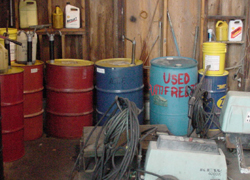New York Sea Grant's
Marina Pollution Prevention Web Site
Section 1: Mechanical Activities
-
Antifreeze
Potential Environmental Impacts
Antifreeze can pollute groundwater, surface water and drinking
water supplies if dumped, spilled or leaked, and is harmful to
marine and aquatic life. While in an engine,  antifreeze
can become contaminated with lead or fuel to the point where it
must be managed as a hazardous waste. There are two types of antifreeze.
Antifreeze with ethylene glycol, a greenish-yellow, odorless,
sweet-tasting chemical, poses a serious health hazard to humans
and animals if ingested. Antifreeze with propylene glycol, which
is less toxic, but often marketed as nontoxic, is recommended
for use. antifreeze
can become contaminated with lead or fuel to the point where it
must be managed as a hazardous waste. There are two types of antifreeze.
Antifreeze with ethylene glycol, a greenish-yellow, odorless,
sweet-tasting chemical, poses a serious health hazard to humans
and animals if ingested. Antifreeze with propylene glycol, which
is less toxic, but often marketed as nontoxic, is recommended
for use.
Best Management Practices
- Segregate
used antifreeze from other wastes. Label the container "Waste
Antifreeze."
- Use propylene
glycol antifreeze (usually pink or orange) which is less toxic
than ethylene glycol (usually green) where appropriate. Sell propylene
glycol in your ships store and recommend its use to your customers.
- Recover antifreeze
used to winterize systems and either recycle or dispose using
a licensed waste hauler. (Look under "Waste Reduction, Disposal,
and Recycling Services, Industrial" in your local phone book
to locate a permitted hauler near you.)
- Recycling
options for antifreeze include:
1. Purchase
on-site antifreeze recycling equipment (for examples of
recycling equipment, click
here) and recycle at your facility. Conduct
a hazardous waste determination (i.e., test the residue or
filter cartridge) at least one time to verify that the waste
is not hazardous before recycling on-site. Keep a copy of
the test results in your files. (For more about making
Hazardous waste determinations New York, click
here, pdf).
2. Contract
with an on-site mobile recycling service that is permitted
by the state to recycle antifreeze.
3. Contract
with a hauler that recycles the antifreeze off-site (for
examples of haulers click
here) If recycling off-site, use a state-permitted
hauler for transportation to a permitted facility for recycling,
treatment, storage or disposal. Provide well-marked, coverable
containers which are in good condition to collect antifreeze
from customers.
- Use drip
pans and funnels when transferring antifreeze to minimize spills
and drips.
- Store antifreeze
in a container that can be completely drained with a wide opening.
Keep antifreeze storage containers closed at all times. Provide
containment to prevent spills from entering ground water or storm
water. For examples of suitable storage and containment products,
click
here.
-
Wear eye
protection, clothing that covers exposed skin and rubber gloves
when transferring antifreeze. Pour slowly and carefully to avoid
splashing.
-
Never mix
antifreeze with other chemicals.
Regulatory
Issues
- Waste antifreeze
can be either hazardous or non-hazardous, depending upon the levels
of contaminants it contains (the most common contaminants are
lead and benzene). In order to determine which is the case, the
generator must either have their waste tested or utilize reliable
"knowledge of process" information for the waste (if
available) [40 CFR 262.11, click
here] Such information could include testing by
haulers, or studies by industry trade groups. For more information
on New York hazardous waste testing requirements, click
here, pdf.
- Antifreeze
which is hazardous waste must either be recycled or disposed of
via a permitted hazardous waste hauler. While stored on-site,
it must be managed in accordance with hazardous waste storage
requirements [40 CFR 262.11, click
here]. For more information
on New York's Hazardous Waste Regulations and storage requirements,
click
here, pdf.
- Antifreeze
which is not hazardous waste is still considered a nonhazardous
regulated waste, and must be either recycled or disposed of via
a permitted waste hauler. In New York, non hazardous waste antifreeze
may be subject to Chemical Bulk Storage Regulations (click
here, pdf) and storage requirements (click
here).
- Antifreeze
may not be discharged to storm drains, septic systems or sanitary
sewers or to surface waters without authorization from the state.
A hazardous waste determination must be conducted on any materials
used to clean antifreeze spills [40 CFR 262.11, click
here].
- If there
is a stormwater discharge from your facility and you use antifreeze
outdoors, you may have to register for a General Permit for the
Discharge of Storm Water Associated with Industrial Activity ("Storm
Water General Permit"). For more information on stormwater
permitting in New York, click
here
|

 antifreeze
can become contaminated with lead or fuel to the point where it
must be managed as a hazardous waste. There are two types of antifreeze.
Antifreeze with ethylene glycol, a greenish-yellow, odorless,
sweet-tasting chemical, poses a serious health hazard to humans
and animals if ingested. Antifreeze with propylene glycol, which
is less toxic, but often marketed as nontoxic, is recommended
for use.
antifreeze
can become contaminated with lead or fuel to the point where it
must be managed as a hazardous waste. There are two types of antifreeze.
Antifreeze with ethylene glycol, a greenish-yellow, odorless,
sweet-tasting chemical, poses a serious health hazard to humans
and animals if ingested. Antifreeze with propylene glycol, which
is less toxic, but often marketed as nontoxic, is recommended
for use.